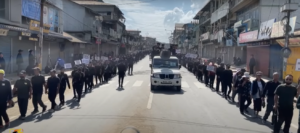Unau is your digital destination for celebrating the essence of brotherhood across the Kuki, Mizo, Zomi, and Hmar tribes.
Imphal – A controversial photo, which has gained widespread attention on social media, depicts a shopkeeper in the Imphal Valley, Manipur, reportedly refusing access to security personnel, including their relatives. The photo, posted on Facebook, shows a sign placed on the counter of a stationary shop that reads, “No customers allowed who are AR (Assam Rifles), RAF (Rapid Action Force), Assam Regiment, India Army, including their relation.”
The image has sparked discussions and debates on social media, reflecting the tensions and emotions surrounding the ongoing violence and unrest in Manipur. While the reasons behind the shopkeeper’s decision remain unclear, it underscores the complex and sensitive nature of the situation in the region.
The Imphal Valley has been experiencing a prolonged period of ethnic conflict and violence, which has resulted in significant disruptions to daily life and strained relationships between various communities and security forces. The presence of security personnel in the area is not only a response to the violence but also a point of contention for some residents.
The shopkeeper’s sign, which restricts access to a particular group of people, reflects the deep-seated sentiments and divisions within the community. It highlights the challenges of reconciliation and trust-building in the aftermath of conflicts that have uprooted lives and communities.
While the controversial sign has drawn attention for its exclusionary message, it also serves as a reminder of the importance of addressing the underlying issues contributing to the unrest in Manipur. The complexities of ethnic tensions, security concerns, and the impact on civilian life require comprehensive and sensitive approaches to find lasting solutions.
The photo has triggered discussions about the role of local businesses, individuals, and communities in the larger context of conflict resolution and peace-building. It is an example of how daily life and commerce are intertwined with the broader socio-political landscape in regions affected by violence and ethnic strife.
As Manipur grapples with these challenges, there is a pressing need for dialogue, reconciliation, and efforts to bridge divides within the community. The controversies surrounding the shopkeeper’s decision highlight the urgency of finding common ground and addressing the root causes of the conflict to ensure a more peaceful and stable future for the region.








